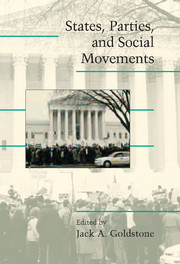Book contents
- Frontmatter
- Contents
- List of Figures and Tables
- Foreword
- Acknowledgments
- Contributors
- INTRODUCTION: BRIDGING INSTITUTIONALIZED AND NONINSTITUTIONALIZED POLITICS
- I States and Social Movements
- 1 COUNTERMOVEMENTS, THE STATE, AND THE INTENSITY OF RACIAL CONTENTION IN THE AMERICAN SOUTH
- 2 STATE VERSUS SOCIAL MOVEMENT: FBI COUNTERINTELLIGENCE AGAINST THE NEW LEFT
- 3 SETTING THE STATE'S AGENDA: CHURCH-BASED COMMUNITY ORGANIZATIONS IN AMERICAN URBAN POLITICS
- 4 STATE PACTS, ELITES, AND SOCIAL MOVEMENTS IN MEXICO'S TRANSITION TO DEMOCRACY
- II Parties and Social Movements
- Afterword: Agendas for Students of Social Movements
- References
- Index
3 - SETTING THE STATE'S AGENDA: CHURCH-BASED COMMUNITY ORGANIZATIONS IN AMERICAN URBAN POLITICS
Published online by Cambridge University Press: 26 February 2010
- Frontmatter
- Contents
- List of Figures and Tables
- Foreword
- Acknowledgments
- Contributors
- INTRODUCTION: BRIDGING INSTITUTIONALIZED AND NONINSTITUTIONALIZED POLITICS
- I States and Social Movements
- 1 COUNTERMOVEMENTS, THE STATE, AND THE INTENSITY OF RACIAL CONTENTION IN THE AMERICAN SOUTH
- 2 STATE VERSUS SOCIAL MOVEMENT: FBI COUNTERINTELLIGENCE AGAINST THE NEW LEFT
- 3 SETTING THE STATE'S AGENDA: CHURCH-BASED COMMUNITY ORGANIZATIONS IN AMERICAN URBAN POLITICS
- 4 STATE PACTS, ELITES, AND SOCIAL MOVEMENTS IN MEXICO'S TRANSITION TO DEMOCRACY
- II Parties and Social Movements
- Afterword: Agendas for Students of Social Movements
- References
- Index
Summary
On June 5, 1991 in San Jose, California, 800 church members attended a “prayer service” whose special audience was Mayor Susan Hammer. Amidst incense, candles, religious music, and prayers to “free the oppressed of our city, especially our youth,” the 800 faithful watched their leaders propose a range of programs, a comprehensive antidrug master plan, and a long-range plan to divert San Jose Redevelopment Agency funds to youth services. Instead of the threatened $2.8 million cut to neighborhood services, the mayor offered them a five-year $6 million set of programs designed and funded as they had proposed.
On September 28, 1997, in St. Louis, 750 church members sacrificed their Sunday afternoon and a St. Louis Rams home game to attend a “Public Meeting on Smart Growth” in the echoing gymnasium of the University of Missouri at St. Louis. The roll was called with nine church denominations represented. Black and white children gave prayers for their future. In a “reflection,” Monsignor Ted Wojcicki recalled the church's commitment to “the poor and marginalized” and reminded the crowd that “the Book of Nehemiah says ‘Come let us rebuild the wall of Jerusalem!’” The Rev. Sylvester Laudermill, Jr., African Methodist Episcopal, thundered, “We demand smart growth in the St. Louis region! Are you with me?” to applause; “Are you with me?” More applause. Attached to the program everyone received was a “Theological Statement on Smart Growth.”
Neither of the foregoing sounds like a conventional description of agenda setting and policymaking in American politics.
- Type
- Chapter
- Information
- States, Parties, and Social Movements , pp. 78 - 106Publisher: Cambridge University PressPrint publication year: 2003
- 4
- Cited by

